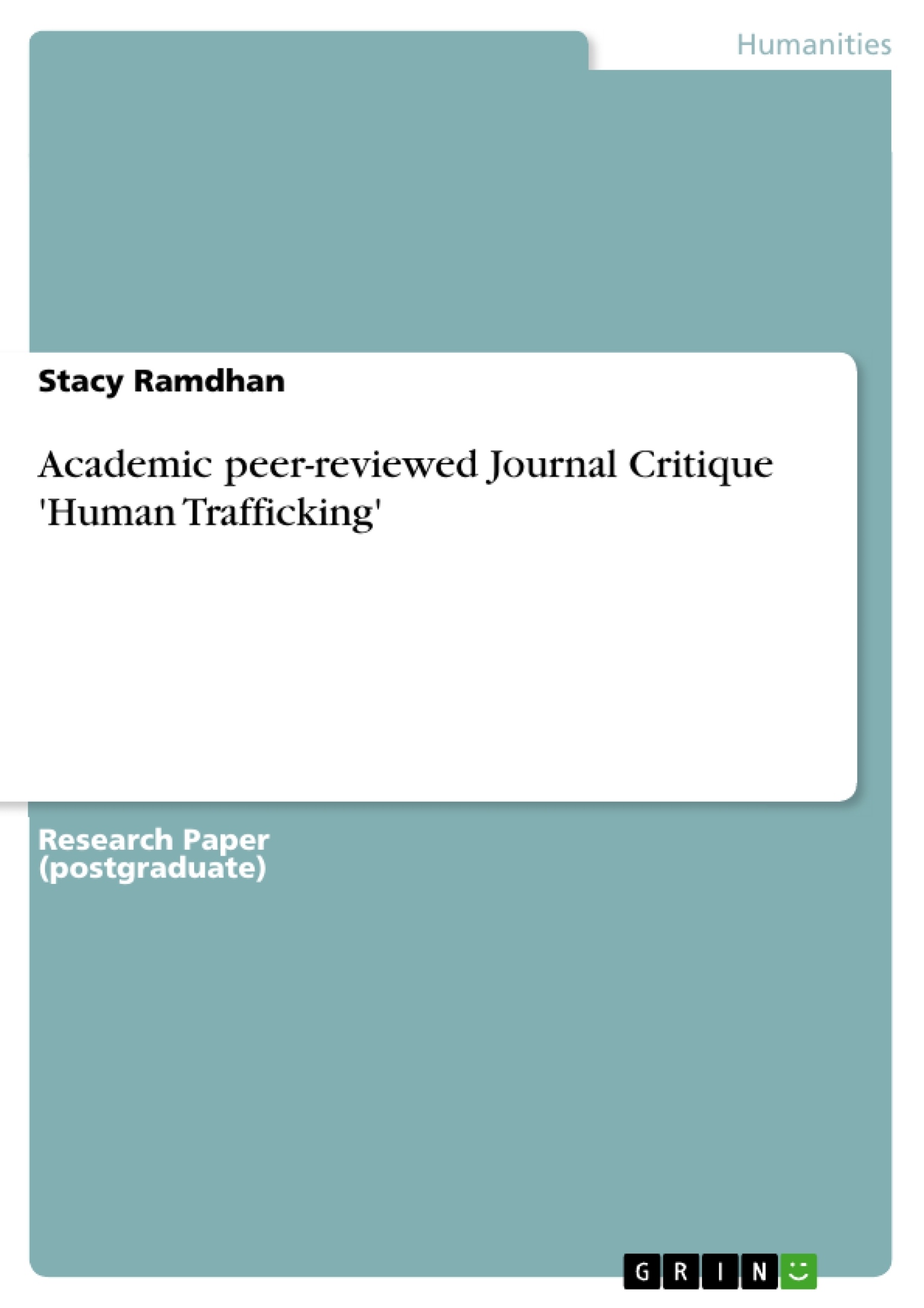The article has presented an overview on the legislative and policy responses to the prime issue trafficking, where they have come from, and where they are going with respect to the development at the UK, EU and international level. There was inadequacy of the data on trafficking as well as the policy responses solely focused on victim-centred approach neglected the other areas of this crime that are arguably equally significant. It appears to be a renewed focus on the need for better data to build the policy responses, and to collect more robust data for policy developments. At present Goodey concluded that there seems to be a shift with respect to its focus of attention of trafficking for labour exploitation and child trafficking at the same time as trafficking continues to respond to the ‘migration-crime- security’ nexus. Presently, Goodey argue that there is a concern of the knowledge on traffickers themselves but there is still a great deal to know about the demand side of prostitution so it can provide insights for the policy responses in the area of trafficking prevention. He also concluded that the list of areas to be research could be extended to assist the policy responses to
address this crime.
Inhaltsverzeichnis (Table of Contents)
- Introduction
- The Nature and Extent of Trafficking
- Legal Recognition and Current Responses
- Policy Responses to Sketchy Data
- Methodology and Limitations
- Qualitative Victims' Accounts
- Use of Citation Index, Guesstimates, and Estimated Statistics
- The Discursive History of Human Trafficking
- Feminist Debates
- International and U.S. Policy
- The UN's Global Programme Against Trafficking (GPAT)
- Focus on Sex Trafficking
- Overlaps with Human Smuggling
- Criticisms of Policy Responses
- Focus on Crime Against States
- Neglect of Victim Needs
- Insufficient Data and Reliability
- Underreporting and Under-Detection
- Domination of Sex Trafficking in Data
- Different Methodologies for Estimating Trafficking
- Internal Trafficking and Organized Crime
Zielsetzung und Themenschwerpunkte (Objectives and Key Themes)
This journal article critically examines the issue of human trafficking, specifically focusing on the limitations of data and the resulting policy responses. It aims to highlight the inadequacy of existing data on trafficking, particularly in terms of its reliability and validity. The article also explores the disproportionate focus on sex trafficking in policy responses, neglecting other forms of exploitation.
- Data Reliability and Validity
- Policy Responses to Limited Data
- Focus on Sex Trafficking vs. Other Forms of Exploitation
- Trafficking as a Human Rights Abuse
- The Importance of Robust Data for Effective Policy Development
Zusammenfassung der Kapitel (Chapter Summaries)
The article begins by introducing the nature and extent of human trafficking, outlining its legal recognition and current responses. It then examines the methodology used in gathering data on trafficking, highlighting the reliance on qualitative victim accounts, citation index, guesstimates, and estimated statistics. The author argues that these methods are insufficient to provide an accurate and reliable account of trafficking.
Further, the article explores the historical discourse surrounding human trafficking, particularly the feminist debates and the evolution of international and U.S. policy. It criticizes the UN's Global Programme Against Trafficking (GPAT) for its disproportionate focus on sex trafficking and its overlap with human smuggling. The article also examines the shortcomings of policy responses in addressing the needs of victims and the lack of robust data on the extent and nature of trafficking.
The article concludes by highlighting different methodologies for estimating trafficking and emphasizing the need for a comprehensive understanding of the issue, including internal trafficking and the involvement of organized crime. It urges for a more inclusive approach to policy development, one that addresses all areas of trafficking and acknowledges the complexity of the issue.
Schlüsselwörter (Keywords)
Human trafficking, sex trafficking, forced labor, data reliability, policy responses, victim rights, human rights, international cooperation, UN convention, European Union, UK, qualitative research, methodology, organized crime, data collection.
Frequently Asked Questions
What is the main criticism of current human trafficking data?
The article argues that existing data is often based on "guesstimates," estimated statistics, and qualitative victim accounts, which lack the reliability and validity needed for robust policy development.
Why is the focus on sex trafficking considered problematic in policy?
By focusing predominantly on sex trafficking, policy responses often neglect other significant forms of exploitation, such as forced labor and child trafficking.
What is the "migration-crime-security" nexus?
This term refers to the framework where trafficking is viewed primarily as a threat to state borders and security rather than a human rights violation against individuals.
What are the limitations of the UN's Global Programme Against Trafficking (GPAT)?
Critics point out its disproportionate focus on sex trafficking and the significant overlap with human smuggling, which can lead to inadequate responses for victims of other trafficking types.
How does underreporting affect trafficking statistics?
Due to the clandestine nature of the crime and the vulnerability of victims, under-detection and underreporting are major hurdles, making it difficult to assess the true extent of trafficking.
What research areas could improve policy responses?
The author suggests researching the "demand side" of exploitation and gaining more knowledge about the traffickers themselves to create more effective prevention strategies.
- Arbeit zitieren
- BSc, MSc Stacy Ramdhan (Autor:in), 2010, Academic peer-reviewed Journal Critique 'Human Trafficking', München, GRIN Verlag, https://www.grin.com/document/175791



